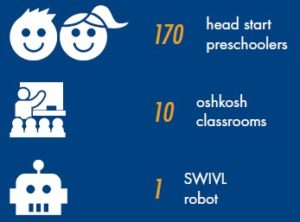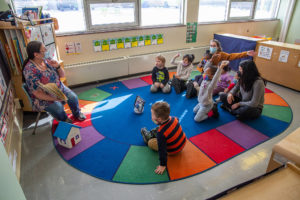Nurturing Care for Early Childhood Development

Data from 2022 Impact Report
It’s not uncommon for preschoolers in Hannah Beduhn’s Head Start class to get upset. They might hit another person, throw a toy, or in many cases start screaming. “They have all these big emotions in their tiny little bodies, and they are still learning what to do with those feelings,” says Beduhn, a teacher of 3-year-olds at the UW Oshkosh Head Start Center in Oshkosh.
Head Start has a multi-tiered approach to helping students in their moments of crisis. Its staff includes three social emotional development specialists that divide their time between 29 classrooms at eight early learning centers throughout northeast Wisconsin including two in Oshkosh. These specialists help students learn how to manage difficult emotions and coach teachers on effective ways to guide students through distress.
“When I’m in the classroom, I might be modeling behaviors for students, like how to play with others or sit at a table, or helping teachers swoop in when a child needs help calming down or managing their feelings, working with them through whatever underlying stress, anxiety, or trauma is fueling the behavior,” says social emotional development specialist Lisa Kortbein.
In addition, Head Start teachers are trained on how to create a classroom environment that promotes kids’ social-emotional development through specialized, research-based approaches called the Pyramid Model and Conscious Discipline.
 Teachers also benefit from regular classroom observations by a mental health professional from Catalpa Health who can conduct individual child observations and meet with families upon request.
Teachers also benefit from regular classroom observations by a mental health professional from Catalpa Health who can conduct individual child observations and meet with families upon request.
When pandemic safety protocols prevented in-person classroom observations in 2021, virtual classroom observation was introduced using a SWIVL robot. The robot, which allows teachers to record or live stream videos for coaching and self-reflection, is programmed to follow markers containing a microphone that are placed on both the teacher and individual child.
“Often the kids forget that they are wearing a microphone. I have used SWIVL recordings from playtime to try to understand what triggered a child’s aggressive behavior or to look at speech concerns in a more natural setting,” shares Head Start teacher Debra Longworth.
Some of these interventions, like the expanded presence of social emotional specialists and partnership with Catalpa mental health professionals, are being piloted at the two Oshkosh Head Start Centers with the support of a three-year $301,000 grant from the Basic Needs Giving Partnership, which is supported by the U.S. Venture Fund for Basic Needs within the Oshkosh Area Community Foundation, the J.J. Keller Foundation, and other community partners. The hope is that the project demonstrates positive outcomes and Head Start federal funding could be realigned to support the additional specialized staff and training expenses at all locations.


Leave a Reply